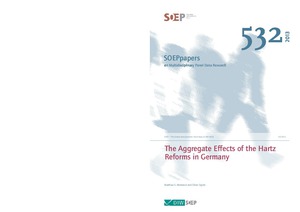The aggregate effects of the Hartz reforms in Germany
"This paper quantifies the impact of the Hartz reforms on matching efficiency, using monthly SOEP gross worker flows (1983-2009). We show that, until the early 2000s, close to 60% of changes in the unemployment rate are due to changes in the inflow rate (job separation). On the contrary, since...
| Main Authors: | , |
|---|---|
| Institution: | ETUI-European Trade Union Institute |
| Format: | TEXT |
| Language: | English |
| Published: |
Berlin
2013
DIW |
| Subjects: | |
| Online Access: | https://www.labourline.org/KENTIKA-19129336124919475189-The-aggregate-effects-of-the-H.htm |
| Summary: | "This paper quantifies the impact of the Hartz reforms on matching efficiency, using monthly SOEP gross worker flows (1983-2009). We show that, until the early 2000s, close to 60% of changes in the unemployment rate are due to changes in the inflow rate (job separation). On the contrary, since the implementation of the reforms in the mid-2000s, the importance of the outflow rate (job finding) has been steadily increasing. This indicates that matching efficiency has improved substantially in recent years. Results from an estimated matching function — pointing to efficiency gains of more than 20% — corroborate this finding." |
|---|---|
| Physical Description: | 39 p. Digital |

